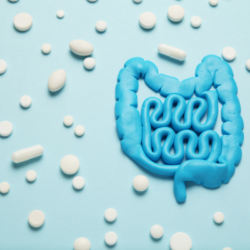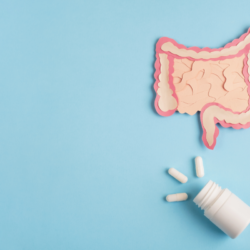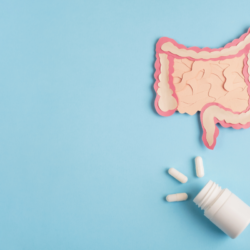Probiotics are living microorganisms that have been shown to benefit the health of the host when given in adequate doses. Lactobacillus and Bifidobacterium species are most commonly used as probiotics. The yeast Saccharomyces boulardii as well as some species of E. coli and Bacillus are also used. Among the newcomers, we can also count Clostridium butyricum, recently authorized as a novel food by the European Union.
A little history :
Over a century ago, Elie Metchnikoff (professor at the Institut Pasteur) observed health benefits from bacteria that produce lactic acid. These benefits actually lead to greater longevity. Suggesting that “intestinal auto intoxication” and the resulting aging could therefore disappear by modifying the microbial flora of the intestine, he developed a diet based on milk fermented by a bacterium he called “Bulgarian bacillus. ”
In 1917, before the discovery of penicillin by Sir Alexander Fleming, German scientist Alfred Nissle isolated a non-pathogenic strain of Escherichia coli. This strain was isolated from the stool of a World War I soldier who did not develop enterocolitis during a severe epidemic of shigellosis. The isolated strain of Escherichia coli is one of the few examples of a probiotic that is not a lactic acid bacteria.
Henry Tissier (of the Institut Pasteur) isolated a Bifidobacterium from a breast-fed child with the intention of administering it to children suffering from diarrhea in particular. He found that the bifidobacteria would replace the proteolytic bacteria that cause diarrhea. In Japan, Dr Minoru Shirota isolated the strain Lactobacillus casei Shirota for use in ultimately fighting diarrhea epidemics.
What is the role of probiotics ?
Lactic acid bacteria, used for the preservation of food by fermentation for thousands of years, can indeed play a dual role as agents of food fermentation and potentially as beneficial agents for health. In addition, the function of probiotics and prebiotics intertwines with the microbes that colonize the gut in humans.
Focus on prebiotics :
Prebiotics serve as a food source for beneficial commensal gut microbes and thus promote health. However, the concept of prebiotics is more recent than that of probiotics. It was first offered in 1995 by Gibson and Roberfroid.
The administration or use of prebiotics or probiotics, however, aims to influence the intestinal environment, itself dominated by trillions of commensal microbes, in order to
help improve human health.
What are the most common prebiotics ?
- Oligofructose
- Inulin
- Galacto-oligosaccharides
- Lactulose
- Breast milk oligosaccharides
The fermentation of oligofructose in the colon indeed generates a large number of physiological effects including an increase in the number of bifidobacteria in the colon, an increase in the absorption of calcium, an increase in the weight of the stools, a shortening of the time. gastrointestinal transit, as well as a decrease in blood lipids.
The increase in bifidobacteria in the colon has been hypothesized to benefit health through the production of compounds that inhibit potential pathogens by decreasing
blood ammonia content and producing vitamins and digestive enzymes. Symbiotics are, in fact, suitable combinations of prebiotics and probiotics. A symbiotic product exerts a pre- and probiotic effect.
Some clinical applications of different pre- and probiotics in various pathologies :
The changes in the intestinal microbiota induced by an ultra-processed Western diet in particular promote the development of neurodegenerative diseases.
Indeed, alterations in the microbiota are observed in Parkinson’s disease, such as intestinal dysbiosis.
Likewise, there is a change in the microbiota in Alzheimer’s disease, a marked improvement in symptoms was observed in a patient with Alzheimer’s disease, following a fecal microbiota transplant for Clostridium difficile infection.
Certain probiotics can stimulate an innate immune response (phagocytosis, cytokines) in healthy individuals, thus shortening the course of infectious episodes (in particular viral gastroenteritis in children) or increasing protective antibodies during vaccinations.
-
Treatment of acute diarrhea :
However, different strains of probiotics have been shown to be useful in reducing the severity and duration of acute infectious diarrhea in children. Oral administration of probiotics reduces the duration of acute diarrheal illness in children by about one day.
-
Prevention of diarrhea associated with antibiotics :
In the prevention of antibiotic-associated diarrhea, there is strong evidence for the efficacy of probiotics in adults and children on antibiotic treatment.
-
Prevention of radiation-induced diarrhea :
The gut microbiota does indeed play an important role in radiation-induced diarrhea. It strengthens the function of the intestinal barrier by improving innate immunity and stimulating the repair mechanisms of the intestine. Probiotics may be of benefit in the prevention and treatment of radiation-induced diarrhea.
-
Prevention and treatment of hepatic encephalopathy :
Prebiotics like lactulose are commonly used in the prevention and treatment of hepatic encephalopathy.
-
Immune response :
Several strains of pre- and probiotics are useful in enhancing the immune response in acute infectious disease.
-
Chronic inflammatory bowel disease :
-
Ulcerative colitis
-
Some probiotics have been shown to be safe and as effective as conventional treatments. They induced higher response and remission rates in ulcerative colitis.
A reduction in intestinal bloating and gas is the result of treatment with probiotics; a few strains can additionally relieve pain and provide overall relief.
The use of probiotics induces a marked improvement in the symptoms of irritable bowel (or functional colopathy):
-
-
-
- Lactobacillus reuteri diminue la prolifération de bactéries pathogènes, améliore la qualité du microbiote et de la santé en résultant, elle sécrèterait une substance nommée reutérine qui inhibe la croissance de bactéries gram-positives et gram-négatives, de levures, d’agents fongiques et de protozoaires
- Bifidobacterium bifidum diminue la symptomatologie de l’intestin irritable et améliore la qualité de vie
- Lactobacillus plantarum diminue douleurs et flatulences de la colopathie fonctionnelle ou ” syndrome de l’intestin irritable “, améliore l’immunité locale, et la fonction de la barrière épithéliale
- Lactobacillus gasseri est anti-inflammatoire dans les maladies chroniques inflammatoires de l’intestin
-
-
-
-
Colic
-
Certain strains of probiotics have been shown to be effective in reducing colic crying in breastfed infants.
Streptococcus thermophilus and Lactobacillus delbrueckii improve lactose digestion and reduce symptoms associated with lactose intolerance.
-
-
Necrotizing enterocolitis
-
Supplementing with probiotics also reduces the risk of necrotizing enterocolitis in premature babies.
-
Vaginal infections :
Lactobacillus casei rhamnosus induces regeneration of the vaginal flora after antibiotic treatment for bacterial vaginosis and decreases the recurrence of mycosis in women suffering from recurrent vulvovaginal candidiasis. Lactobacillus crispatus is predominant in the healthy vaginal microbiota, it synthesizes large amounts of lactic acid with antimicrobial and immunomodulating properties. It can be used as a preventative probiotic against vaginal infections or as an addition to antibiotic or antifungal treatment.
Lactobacilli and bifidobacteria indeed play a favorable role in anxiety and mental symptoms of chronic fatigue.
What are the precautions for using probiotics ?
- Contraindicated in immunocompromised or unbalanced diabetic patients
- Not recommended for people with a venous catheter (risk of Lactobacillus bacteremia)
- Avoid CLA supplementation in pregnant women
- Do not use in case of weakened immune system due to disease (AIDS, lymphoma) or medical treatment (corticosteroid therapy, chemotherapy, radiotherapy)
- Do not use in case of nausea, fever, vomiting, diarrhea containing blood or severe pain in the stomach
Foods containing probiotics are, however, the subject of much research. Through their interactions with bacteria and immune cells in the digestive tract, they play a preventive and curative role. Whether in digestive pathologies as sometimes extra-digestive.





